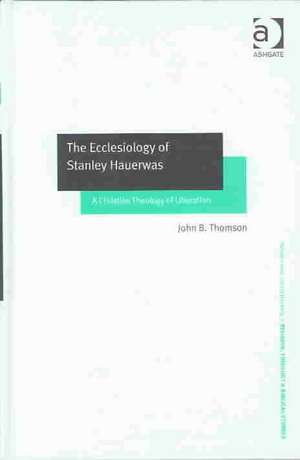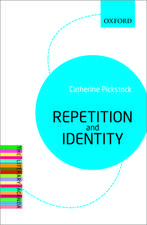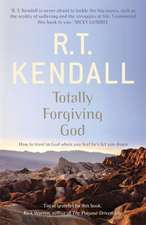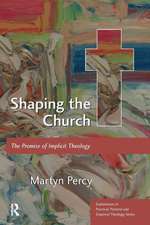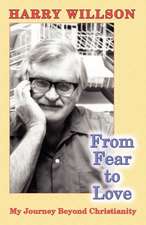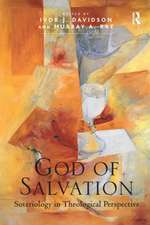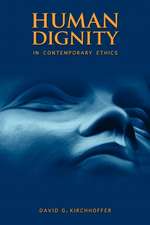The Ecclesiology of Stanley Hauerwas: A Christian Theology of Liberation: Routledge New Critical Thinking in Religion, Theology and Biblical Studies
Autor John B. Thomsonen Limba Engleză Hardback – 16 iul 2003
| Toate formatele și edițiile | Preț | Express |
|---|---|---|
| Paperback (1) | 469.34 lei 6-8 săpt. | |
| Taylor & Francis – 27 feb 2017 | 469.34 lei 6-8 săpt. | |
| Hardback (1) | 1000.27 lei 6-8 săpt. | |
| Taylor & Francis – 16 iul 2003 | 1000.27 lei 6-8 săpt. |
Din seria Routledge New Critical Thinking in Religion, Theology and Biblical Studies
-
 Preț: 302.55 lei
Preț: 302.55 lei -
 Preț: 325.30 lei
Preț: 325.30 lei -
 Preț: 326.73 lei
Preț: 326.73 lei -
 Preț: 311.41 lei
Preț: 311.41 lei -
 Preț: 302.07 lei
Preț: 302.07 lei -
 Preț: 328.46 lei
Preț: 328.46 lei -
 Preț: 310.80 lei
Preț: 310.80 lei -
 Preț: 293.82 lei
Preț: 293.82 lei -
 Preț: 326.55 lei
Preț: 326.55 lei -
 Preț: 309.23 lei
Preț: 309.23 lei -
 Preț: 310.41 lei
Preț: 310.41 lei -
 Preț: 324.89 lei
Preț: 324.89 lei -
 Preț: 340.67 lei
Preț: 340.67 lei -
 Preț: 311.03 lei
Preț: 311.03 lei -
 Preț: 311.41 lei
Preț: 311.41 lei -
 Preț: 401.92 lei
Preț: 401.92 lei - 28%
 Preț: 820.71 lei
Preț: 820.71 lei - 26%
 Preț: 764.69 lei
Preț: 764.69 lei - 18%
 Preț: 1059.45 lei
Preț: 1059.45 lei - 18%
 Preț: 1054.71 lei
Preț: 1054.71 lei - 18%
 Preț: 1054.71 lei
Preț: 1054.71 lei - 28%
 Preț: 823.34 lei
Preț: 823.34 lei - 18%
 Preț: 1054.71 lei
Preț: 1054.71 lei - 18%
 Preț: 1058.79 lei
Preț: 1058.79 lei - 18%
 Preț: 1054.71 lei
Preț: 1054.71 lei - 18%
 Preț: 1057.09 lei
Preț: 1057.09 lei - 18%
 Preț: 1055.51 lei
Preț: 1055.51 lei - 20%
 Preț: 191.60 lei
Preț: 191.60 lei - 18%
 Preț: 1056.28 lei
Preț: 1056.28 lei - 18%
 Preț: 700.75 lei
Preț: 700.75 lei - 18%
 Preț: 1054.71 lei
Preț: 1054.71 lei - 31%
 Preț: 767.07 lei
Preț: 767.07 lei - 26%
 Preț: 877.59 lei
Preț: 877.59 lei - 18%
 Preț: 1054.71 lei
Preț: 1054.71 lei - 18%
 Preț: 1057.89 lei
Preț: 1057.89 lei - 31%
 Preț: 765.40 lei
Preț: 765.40 lei - 18%
 Preț: 1054.71 lei
Preț: 1054.71 lei - 18%
 Preț: 1000.27 lei
Preț: 1000.27 lei - 30%
 Preț: 850.17 lei
Preț: 850.17 lei - 18%
 Preț: 1060.25 lei
Preț: 1060.25 lei - 18%
 Preț: 1059.45 lei
Preț: 1059.45 lei - 18%
 Preț: 1059.45 lei
Preț: 1059.45 lei - 18%
 Preț: 1000.27 lei
Preț: 1000.27 lei - 18%
 Preț: 1054.71 lei
Preț: 1054.71 lei - 18%
 Preț: 1108.37 lei
Preț: 1108.37 lei - 26%
 Preț: 821.13 lei
Preț: 821.13 lei - 26%
 Preț: 820.32 lei
Preț: 820.32 lei - 18%
 Preț: 1054.71 lei
Preț: 1054.71 lei - 18%
 Preț: 1053.79 lei
Preț: 1053.79 lei
Preț: 1000.27 lei
Preț vechi: 1219.84 lei
-18% Nou
Puncte Express: 1500
Preț estimativ în valută:
191.43€ • 199.11$ • 158.03£
191.43€ • 199.11$ • 158.03£
Carte tipărită la comandă
Livrare economică 14-28 aprilie
Preluare comenzi: 021 569.72.76
Specificații
ISBN-13: 9780754633945
ISBN-10: 0754633942
Pagini: 256
Dimensiuni: 156 x 234 x 16 mm
Greutate: 0.45 kg
Ediția:1
Editura: Taylor & Francis
Colecția Routledge
Seria Routledge New Critical Thinking in Religion, Theology and Biblical Studies
Locul publicării:Oxford, United Kingdom
ISBN-10: 0754633942
Pagini: 256
Dimensiuni: 156 x 234 x 16 mm
Greutate: 0.45 kg
Ediția:1
Editura: Taylor & Francis
Colecția Routledge
Seria Routledge New Critical Thinking in Religion, Theology and Biblical Studies
Locul publicării:Oxford, United Kingdom
Cuprins
Contents: Preface; Delineating an architecture of Stanley Hauerwas's project: Recovering Christian liberty; Recovering ecclesial liberty; Hauerwas, liberalism and the Enlightenment project: Hauerwas and the Enlightenment project; Emancipation as the Enlightenment agenda; Liberation as the ecclesiology project rather than the Enlightenment project; Theological liberalism and the loss of Christian freedom: Theological liberalism; Liberation from liberalism?; Karl Barth and Yale; Theocentric liberalism or theology in a third way; Christian freedom as embodied narrative: Hauerwas and narrative; An emancipatory narrative? An ecclesiology of liberation: the politics of Christian freedom?: Theology, politics and liberation; Hauerwas's project: an ecclesial politics of liberation; Hauerwas's project: an adequate ecclesiology of liberation?; Conclusion; Bibliography; Index.
Notă biografică
The Revd Canon Dr John B. Thomson, Director of Ministry, Diocese of Sheffield, UK
Recenzii
'The strength of this book is that it systematically presents the work of an important theologian. In doing so, it situates him within a broader cultural and theological debate. For this reason, it will assist those who are trying to understand the relationship between the church and world today, and to articulate the mission of the church.' Theology Today
Descriere
This book presents the theological work of Stanley Hauerwas as a distinctive kind of 'liberation theology'. John Thomson offers an original construal of this diffuse, controversial, yet highly significant modern theologian and ethicist. Organising Hauerwas' corpus in terms of the focal concept of liberation, Thomson shows that it possesses a greater degree of coherence than its usual expression in ad hoc essays or sermons. John Thomson locates Hauerwas in relation to a wide range of figures, including the obvious choices - Rauschenbusch, Niebuhr, Barth, Yoder, Lindbeck, MacIntyre, Milbank and O'Donovan - as well as less expected figures such as Gadamer, Habermas, Ricoeur, Pannenberg, Moltmann, and Hardy. Providing a structured and rigorous outline of Hauerwas' intellectual roots, this book presents an account of his theological project that demonstrates an underlying consistency in his attempt to create a political understanding of Christian freedom, reaching beyond the limitations of the liberal post-enlightenment tradition. Hauerwas is passionate about the importance of moral discourse within the Christian community and its implications for the Church's politics. When the Church is often perceived to be in decline and an irrelevance, Hauerwas proffers a way of recovering identity, confidence and mission, particularly for ordinary Christians and ordinary churches. Thomson evaluates the comparative strengths and weaknesses of Hauerwas' argument and indicates a number of vulnerabilities in his project.
